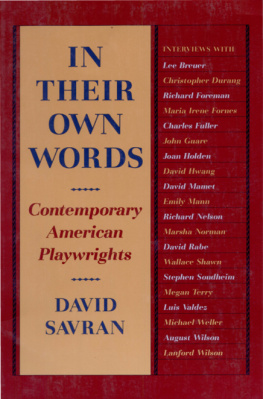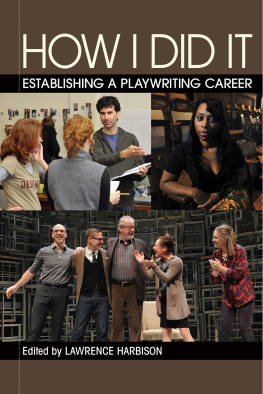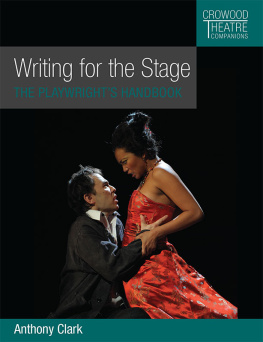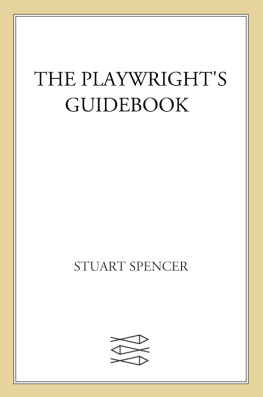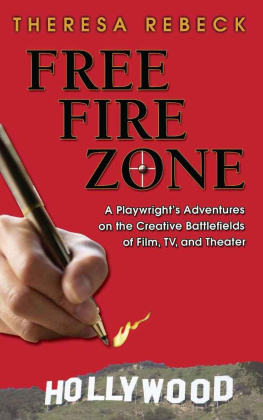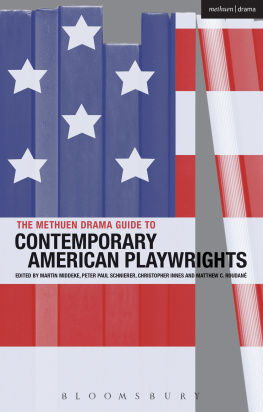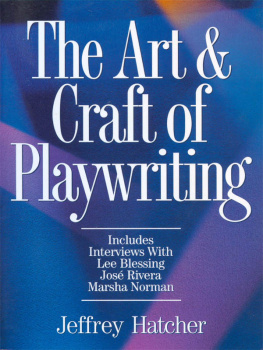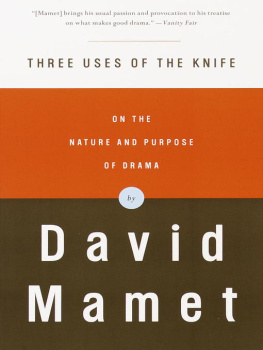WHAT PLAYWRIGHTS TALK ABOUT WHEN THEY TALK ABOUT WRITING
WHAT PLAYWRIGHTS TALK ABOUT WHEN THEY TALK ABOUT WRITING
JEFFREY SWEET

DAVID CHARLES HORN FOUNDATION
This book was published with assistance from the David Charles Horn Foundation, established in 2003 by Francine Horn to honor the memory of her husband, David. In keeping with David Horns lifetime commitment to the written word, the David Charles Horn Foundation commemorates his aspirations and achievements by supporting new initiatives in the literary and dramatic arts.
Copyright 2017 by Yale University. All rights reserved. This book may not be reproduced, in whole or in part, including illustrations, in any form (beyond that copying permitted by Sections 107 and 108 of the U.S. Copyright Law and except by reviewers for the public press), without written permission from the publishers.
Yale University Press books may be purchased in quantity for educational, business, or promotional use. For information, please e-mail (U.K. office).
Library of Congress Control Number: 2016948022
ISBN: 978-0-300-21144-3 (hardcover : alk. paper)
A catalogue record for this book is available from the British Library.
This paper meets the requirements of ANSI/NISO Z39.48-1992 (Permanence of Paper).
For Kristine, with love and thanks for kindness and patience
CONTENTS
FOREWORD
LINDA WINER
If this book were a movie, it should begin with an image from the epilogue. There, in a 60s caf called Rikers on Sheridan Square, all the dashing young men (yes, exclusively men) who created what we now package into a romantic blur called off-off-Broadway would be hanging out and drinking, smoking whatever, and talking nonstop about the theater.
Or so Lanford Wilson suggested in 2008 in a dialogue with Jeffrey Sweet printed in the last chapter of this invaluable book. By then, Rikers was long gone, and we lost Wilson, too soon, in 2011. But his words, remembering all the night owlshe and Sam Shepard were worse than anyoneconjure a creative community that I imagine most theater lovers want to believe exists in New York, in London, and everywhere theater is made.
For the most part, however, playwriting begins as a solo impulse and, despite all the rich collaborations described in the following chapters, remains a solitary obsession. A plumed muse of inspiration, seldom documented, will not likely be perched on any shoulder. Perhaps more typically, Lynn Nottage had the words Sustain the complexity taped over her computer while writing her 2009 Pulitzer Prize-winning drama, Ruined.
And when the lonely work is finished for the day, all the different playwrights (finally, not just men) do not head to their special gathering place to crow and complain about this art, this business, and this drive that form the basis for what we see on the stage.
Instead, Sweet, himself a playwright, has come up with the next best thing, a theoretical clubhouse where the rest of us can listen in on thoughts that, except perhaps in classrooms, only lurk and roil as internal monologues in the private worlds of people who write for the theater. Though the playwrights cant physically cross paths in these pages, obviously, they respond here to Sweets questions, encyclopedic prods, and gentle challenges in ways that feel more like conversationsarguments, eventhat lower the drawbridge over the moat that separates a playwrights intentions from the public result. What a pleasure it is to follow threads and dividing lines on many subjects through these chapters.
The collection here concentrates on what Sweet convincingly divides into the post-Edward Albee playwrights, most of them Americans who have managed to make careers away from commercial Broadway, and the post-John Osborne writers, all British here, beginning with David Hare. As Hare, author of such deliciously rigorous plays as Plenty and Via Dolorosa, puts it, Osbornes Look Back in Anger, that legendarily explosive 1956 blue-collar drama, did so much for all the rest of us by not being in hock to literature or in hock to show business.
In many ways, including the source of ideas and the mission of theater, it feels alarmingly easy to separate playwrights by nationality. Despite the dangers of glib generalizations, however, American theater is most often seen through what Kwame Kwei-Armah, the British playwright and artistic director of Baltimores Center Stage, describes as the lens of the family. The English are bred on whats commonly known as state-of-the-nation plays. In other words, much American theater involves dysfunctional families and relationships unraveling at or near home. English playsmost recently, King Charles III and The Audiencego for the big political picture, some even presuming to imagine conversations between living politicians. This distinction is neither good nor bad. For the most part, as these interviews show and tell, it simply is.
So yes, ideas must come from somewherebut from where? And, while were asking impertinent questions, for what purpose?
For those who like their cultural sensibilities as smackdowns, consider two very different plays: Marsha Normans 1983 Pulitzer Prize-winning night, Mother, which is set in the final hours before a daughters suicide, and Hares Stuff Happens, a state-of-two-nations drama that uses transcripts from England and this country about the start of the first Iraq War. Norman firmly believes that playwrights should write out of their stuff. By this, she means that which has been assigned to you by the universe and your upbringing and your presence on the planet and your accident of birth. She defines her own stuff, evocatively, as the trapped girl. To Norman, what the theater can do best is make people feel not so alone. Well, across the ocean and around the philosophical universe, there is Hare, daring playwrights to tackle political taboos: Even if you cant change the world, nevertheless you at least can air the opportunity to change the world. Hare takes pride in that state-of-the-nation play. Norman interruptsif you can imagine them in the same roomto explain that Americans dont do state-of-the-nation plays because were not one people here.
And what about scale? Is it national personality or money that decides the size of the cast and the canvas on which the playwright works? Donald Margulies, winner of the 2000 Pulitzer Prize for Dinner with Friends, has roamed impressively around big subjects but with chamber-sized casts and an emphasis on relationships. He is practical: I dont permit myself to think on a larger canvas. If he wants his work to be produced by American nonprofit theaters, he avoids what he calls the fiscally unwieldy play. Hare, as you might guess, has no patience for Americans who color within the limitations of our theater. He mentions the monumental experiments of Eugene ONeill, then Tony Kushners epic Angels in America. As Hare sees it, Kushner wrote for a theater that did not existand such theater came into being because he wrote this great play.
Lest we glorify the English theaters receptiveness to large work, Sweet helpfully enlightens us about the playfully named but clearly serious Monsterists, cofounded ten years ago by Moira Buffini and nine other young English writers assigned to work in the small studio at the National Theatre. They couldnt help but notice that the big stages were used for dead or long-established playwrights, what she calls the silverback writers. The group even had a manifestowhen was the last time anyone in American theater said that word without snickering?and a symposium to ask how the next generation, marginalized in black-box theaters with chamber-sized casts, could learn to write to scale. Opportunities actually followed.
Next page

